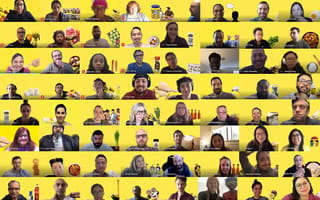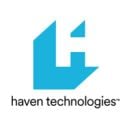There’s a lot of hope at this juncture of the COVID-19 pandemic. People are getting vaccinated, new cases are dropping in the U.S., and there actually seems to be somewhat of an end in sight.
But there’s also a lot of burnout in the workforce.
In the past 15 months, many who retained employment weathered the transition to remote work, battled screen fatigue, carved out a semblance of work-life balance and adjusted to the monotony of pandemic life. Now, despite some approximation of normalcy, people are exhausted, which means tech leaders have to be more creative than ever to keep their teams engaged and morale high.
Some leaders have leaned on strategies they’ve perfected during the pandemic, like Ribbon’s Lindsay Van Kirk, a VP of sales and operations who’s found that clear and direct communication in a remote environment has been a “huge engagement booster.” Other leaders, like Haven Technologies’ CTO Todd Rodgers, has helped organize companywide “Passion Potlucks” where team members are asked to reflect on big questions like, “Why does your work matter to you?”
“This strategy has been helpful in getting our community to pause and reflect on why they come to work each day,” Rodgers said.
Keeping teams engaged is an ongoing effort, which is why Built In NYC caught up with four leaders to learn more about their out-of-the-box approaches that have boosted employee morale, maintained engagement and prevented burnout.
What they do: Haven Technologies is a MassMutual-backed startup that offers an easy and affordable way to buy life insurance online.
What’s a surprising or unique strategy you leverage to improve or bolster team engagement?
This year, our chief culture and innovation officer launched an organization-wide dialogue to help us think through how to do this. We called this the “Passion Potlucks,” and during each session, we challenged each other to reflect on a few questions like, “Why does your work matter to you?” or, “What do we love about our culture and what do we want to improve?” “How can we communicate what matters to us?”
The structure to these dialogues came from our 2020 annual report, which celebrates our customers and their accomplishments. For this year’s report we made a cookbook filled with customers’ recipes of dishes that brought them comfort during quarantine.
During our Passion Potlucks, our leaders asked employees “What is the secret ingredient that makes Haven Technologies special?” We got varied responses — from garam masala to represent our mix of diverse cultures to boiled eggs, “because it’s easy to make and similarly, getting things done here is easy because there’s little bureaucracy,” one team member said. In total, we hosted 44 Passion Potlucks in one month!
What makes this strategy so successful? What results have you seen?
In a fast-paced virtual environment, we felt that this strategy has been helpful in getting our community to pause and reflect on why they come to work each day. We were able to get together in small groups outside of our immediate teams and have meaningful conversations that ultimately helped us to continue to build investment in our work.
We learned that the culture that we’ve co-created helps our people bring their authentic selves to work...’’
Beyond this, these conversations helped us double down on what matters. We learned that the culture that we’ve co-created helps our people bring their authentic selves to work, that our flat hierarchy allows us to consider every voice, and that the love that we have for our customers truly starts with the love that we have for each other. These are pieces of our culture that we’ll be bringing forward as we continue to build Haven Technologies.
What they do: Tango is a healthtech company built by healthcare administration experts that helps partners navigate the complicated 340B system through automation and simplification.
What’s a surprising or unique strategy you leverage to improve or bolster team engagement?
Launched in 2020 at the height of the COVID-19 pandemic, Tango faced challenges building team cohesion and culture when team members were suddenly dispersed and relegated to working from home. Our leadership and people teams immediately identified a three-pronged strategy, designed to make the best of a tough situation, never losing sight of our mission and employee needs: training and development, implementing employee resource groups and increasing team-building events.
Our leadership and people teams immediately identified a three-pronged strategy, designed to make the best of a tough situation...’’
What makes this strategy so successful? What results have you seen?
Here are some examples: A sales representative who is a part-time yoga teacher led us through a yoga class. Our diversity and inclusion ERG launched a series of educational webinars and discussions during Black History Month. In celebration of Women’s History Month, we shared personal anecdotes and learned about women leaders in the health and technology space. Our operations leader led us through a virtual cooking class of his favorite recipe.
These array of activities offer our employees a safe environment for sharing their unique experiences, the flexibility to contribute and opportunities to lead.
What they do: Ribbon is a real estate and fintech company that is redesigning the way people buy and sell their homes to be modern, online and transparent.
What’s a surprising or unique strategy you leverage to improve or bolster team engagement?
I have found that being very explicit with my verbal communication in a remote environment has been a huge engagement booster and motivator for my team. Many times through body language or other non-verbal communication, you have a more clear sense of whether someone is open and receptive to disagreement or is feeling really positive about your work. To account for this communication that is lost in our remote environment, I try to identify these opportunities and be more explicit about communicating these same sentiments verbally. I invite my team to disagree with me during group meetings, I praise them for good work in our public forums or one-on-ones, or even just with a quick Slack note to say “thank you.”
I have seen my team members be more forthcoming with their feedback and feelings...’’
What makes this strategy so successful? What results have you seen?
I think what makes this strategy successful is that it creates certainty and clarity for the team where things may have been more ambiguous at the beginning of our remote work journey. The lack of in-person contact creates a sense of distance that open and direct communication delivered with compassion can bridge. I have seen my team members be more forthcoming with their feedback and feelings, which has allowed us to address different situations more quickly and help them to work confidently while remote.
What they do: Resy is a reservations platform, built and powered by restaurant lovers.
What’s a surprising or unique strategy you leverage to improve or bolster team engagement?
I’ve found that the most important indicator for engagement from the Resy front line support team is how much ownership they feel for our team goals. Instead of establishing and rolling out new procedures for the team to follow, we’ve empowered individual team members to take the lead for distinct aspects of our service. We talk through the details of what we need to accomplish and put them in the driver’s seat to work with their colleagues to come up with solutions. They assist in team training for the rollout, documentation of new procedures and present updates on their initiative in our weekly team meetings. We work together to determine the metrics we need to put in place to measure the success of their initiative, and they work with the team to be sure we accomplish what we set out to achieve.
The most important indicator for engagement from the Resy front line support team is how much ownership they feel for our team goals.’’
What makes this strategy so successful? What results have you seen?
With a seat at the table, the team has a greater understanding of why we’re doing what we’re doing and how it impacts the Resy support experience for our customers. The results have been extremely positive for initiatives big and small.
A recent effort by one of our support representatives led to a 42 percent increase in captured product feedback, which will help inform future product iterations. Outside of any specific initiatives, the team is more engaged in team conversations and regularly shares their ideas for areas we can improve or increase efficiency.












